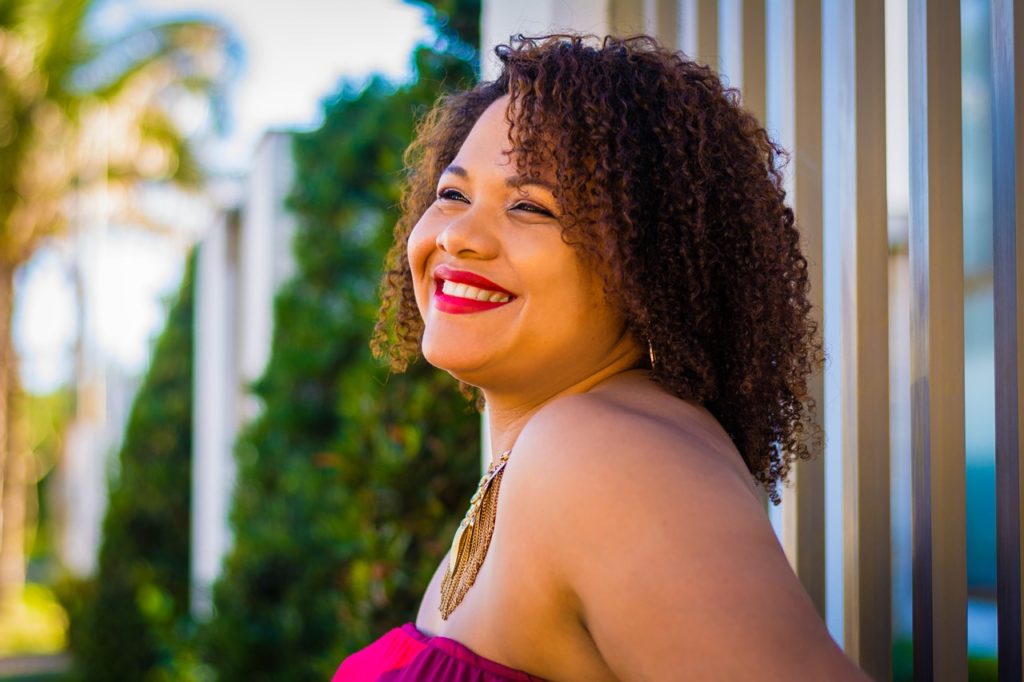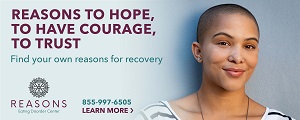- Calls to this hotline are currently being directed to Within Health, Fay or Eating Disorder Solutions
- Representatives are standing by 24/7 to help answer your questions
- All calls are confidential and HIPAA compliant
- There is no obligation or cost to call
- Eating Disorder Hope does not receive any commissions or fees dependent upon which provider you select
- Additional treatment providers are located on our directory or samhsa.gov
Love, Embodied: Body Image, Romance, and Identity

Nikki Rollo, Ph.D., LMFT, CEDS-S, National Director, Program Development at Reasons Eating Disorder Center
Our bodies are a site of struggle and joy. They hold our positive memories and our painful stories: the ache of our heart when we remember the loss of a love, the stretch marks from bearing a child, the crooked bone from an old sports injury, the wrinkles from our worries, and our laughter.
Our bodies are our containers for moving through the world. They are the channels through which we give and experience love.
Sometimes it may feel as if our individual containers have betrayed us, and the work is a twisted and long journey home to our true selves. This challenge holds especially true for those working toward eating disorder recovery.
How do we move toward wholeness, healing, and integration of our full selves while living in these bodies and while pursuing healthy romantic relationships? The answer is often far more complex than simply deciding to love our bodies and accept love from others. For those who struggle with eating disorders, the answers are decidedly less simple than committing to such platitudes.
Call Reasons Eating Disorder Center for Help 855-997-6505
Eating disorders and body image disturbances exacerbate shame, isolation, separateness, and loneliness. As a result, cultivating relationships is an essential component of the recovery process.
However, romantic relationships can prove particularly challenging and complex for those working toward eating disorder recovery. Romantic relationships hold multiple complex connections between body image, sexuality, gender, and intimacy.
Research shows that body image is interconnected with how romantic relationships are experienced and can impact sexual intimacy in both quality and quantity. Additionally, greater body image dissatisfaction has been linked to a less secure and more anxious attachment in romantic relationships.
Simply put, it can be hard to trust your partner’s love for you and your body if you are struggling with negative feelings and thoughts about your sense of self and body image. Furthermore, romantic relationships are those in which we feel the most exposed in terms of emotional vulnerability as well as physical exposure during sexual activity.
In the context of a sexual relationship and moment of intimacy, if you are worried about the shape of your stomach or the presence of stretch marks and cellulite, those thoughts become barriers to true presence. Monitoring how your body looks decreases mindfulness and being in the present moment. Take note: Do body image struggles preclude you from being in a loving, caring relationship? Does poor body image impact the way you value yourself?
If your answer to these questions is yes, what do you do? Most of us cannot simply change our minds about our bodies. Even if we can, is that enough?
We must acknowledge the ways in which systems, culture, and corporations prioritize and value particular bodies and categorize these bodies as good bodies and devalue other bodies. We must recognize the inherent value in marginalized bodies – bodies who are Black, Brown, fat, queer, transgendered, or disabled.
 In service of our individual embodiment and the celebration of others, we must pursue not only body love but make space for the pursuit of body neutrality, body positivity, and ultimately, body liberation. As we grow in our ability to nurture, respect, and applaud our bodies, body image satisfaction grows.
In service of our individual embodiment and the celebration of others, we must pursue not only body love but make space for the pursuit of body neutrality, body positivity, and ultimately, body liberation. As we grow in our ability to nurture, respect, and applaud our bodies, body image satisfaction grows.
How can you get started? Here are a few thought-starters for exploring love, embodied:
Eyes Open Wide
Consider the sociocultural forces that influence body image and the sense of being deserving of love. Beyond how we individually perceive ourselves, body liberation work considers how bodies are treated in the world systemically.
See the messages from culture for what they are. Explore your social media feed, for example, with new eyes. Images in the media prioritize romance and partnering for those who fit a particular thin ideal or standard of beauty.
Investing in a particular body image is portrayed as a way to find a partner. Take inventory of the media, imagery, and messages you consume and remove those that uphold unhealthy and unrealistic standards of beauty and love.
Owning Identity, Body Image, and Worth
Having a strong sense of self and identity is an essential journey and helps cultivate self-worth. The journey is about our relationship with ourselves, with our spiritual nature, and with others.
Take time to discover who you are apart from your physical appearance. What energizes you? What are your values? Sexism, racism, homophobia, transphobia, and gender identity discrimination all deeply impact whether someone experiences the freedom to feel good in their own skin.
Challenging and transforming these views asks us to expose systems of oppression, systems that make some bodies “good” and some bodies “other,” and actively work to construct new self-images that are congruent with each persons’ unique identification and lived experience of their bodies. Along with exploring your identity, engage in practices that cultivate your worthiness. You are worthy of love, care, intimacy, and connection.
Talk About Body Image with Your Partner
 Our bodies are key in our romantic relationships. They are the way we take in the world and our partner. We utilize our senses to experience intimacy, deep connection, love, and trust.
Our bodies are key in our romantic relationships. They are the way we take in the world and our partner. We utilize our senses to experience intimacy, deep connection, love, and trust.
The body shame and low self-worth experienced commonly alongside eating disorders can diminish the experience of connection and can create roadblocks to intimacy. Open the lines of communication with your partner about your own body image.
Together with your partner, you can also explore ways to combat systems of oppression that demonize fat and glorify thin bodies. Tackling these issues together can make an impact on both of your lives while also contributing to a larger scale societal change.
Cultivate Self-Compassion and Celebrate Love
Body liberation work is a spiritual journey. It involves paying attention to your soul. Ask yourself: how do you value your body? In what ways do you express care and love toward your body? Choose to send love to yourself. This doesn’t need to mean loving your body.
Find ways to cultivate and celebrate love – not just romantic love, but love for the various parts of yourself, even if it is hard to love everything you see in the mirror. Express appreciation for yourself, for what your body can do, focusing on function over appearance.
Your body can do and has done amazing things. It has been with you longer than anything or anyone – certainly longer than any romantic relationship. Learning to navigate body image, move toward body positivity, and ultimately experience body liberation, is a journey toward honoring your life’s vehicle.
As you learn to appreciate your body, you strengthen a key channel through which to experience not only romantic relationships but all of life. Love, pain, joy, loss, excitement, sadness, and every emotion in between are all embodied within you.
Embrace the story written within. All of the physical elements that make your body unique – every freckle, every scar, every stretch mark, every crooked tooth – comprises a sentence or chapter of your life’s story. There will never be a more compelling read.
Resources:
Milhausen, R. R., Buchholz, A. C., Opperman, E. A., & Benson, L. E. (2015). Relationships between body image, body composition, sexual functioning, and sexual satisfaction among heterosexual young adults. Archives of Sexual Behavior, 44(6), 1621-1633.
Swami, V., Tran, U. S., Stieger, S., & Voracek, M. (2015). Associations between women’s body image and happiness: Results of the YouBeauty.com body image survey (YBIS). Journal of Happiness Studies, 16(3), 705-718.
Laus, M. F., Almeida, S. S., & Klos, L. A. (2018). Body image and the role of romantic relationships. Cogent Psychology, 5(1)
Ambwani, S., & Strauss, J. (2007). Love thyself before loving others? A qualitative and quantitative analysis of gender differences in body image and romantic love. Sex Roles, 56(1-2), 13-21.
Morrison, K. R., Doss, B. D., & Perez, M. (2009). BODY IMAGE AND DISORDERED EATING IN ROMANTIC RELATIONSHIPS. Journal of Social and Clinical Psychology, 28(3), 281-306.
Wiederman, M. W. (2000). Women’s body image self-consciousness during physical intimacy with a partner. The Journal of Sex Research, 37(1), 60-68.
Robbins, A., & Reissing, E. D. (2018). Appearance dissatisfaction, body appreciation, and sexual health in women across adulthood. Archives of Sexual Behavior, 47(3), 703-714.
Berge JM, Pratt K, Miller L. Weight conversations in romantic relationships: What do they sound like and how do partners respond?. Fam Syst Health. 2016;34(3):213-220. doi:10.1037/fsh0000223
Eisenberg ME, Berge JM, Neumark-Sztainer D. Dieting and encouragement to diet by significant others: associations with disordered eating in young adults. Am J Health Promot. 2013 Jul-Aug;27(6):370-7.
Deville, D. C., Ellmo, F. I., Horton, W. A., & Erchull, M. J. (2015). The role of romantic attachment in women’s experiences of body surveillance and body shame. Gender Issues, 32(2), 111-120.
Cash, T. F., Theriault, J., & Annis, N. M. (2004). BODY IMAGE IN AN INTERPERSONAL CONTEXT: ADULT ATTACHMENT, FEAR OF INTIMACY, AND SOCIAL ANXIETY. Journal of Social and Clinical Psychology, 23(1), 89-103.
Petrucelli, J. (2016). Body-states, body image and dissociation: When not-me is ‘not body’. Clinical Social Work Journal, 44(1), 18-26.
Goins, L. B., Markey, C. N., & Gillen, M. M. (2012). Understanding Men’s body image in the context of their romantic relationships. American Journal of Men’s Health, 6(3), 240-248.
Sydney V. Waring, Allison C. Kelly, Relational body image: Preliminary evidence that body image varies within a person from one specific relationship to another, Body Image,Volume 34,2020,Pages 221-232,
Cash, T. F., Theriault, J., & Annis, N. M. (2004). BODY IMAGE IN AN INTERPERSONAL CONTEXT: ADULT ATTACHMENT, FEAR OF INTIMACY, AND SOCIAL ANXIETY. Journal of Social and Clinical Psychology, 23(1), 89-103
About our Sponsor
Reasons Eating Disorder Center offers a full continuum of care for patients struggling with anorexia, bulimia, binge-eating disorder, and co-occurring issues such as trauma symptoms, substance abuse, bipolar, borderline personality disorder, anxiety, obsessive-compulsive disorder, or depression.
About the Author:
 Nikki Rollo, Ph.D., LMFT, CEDS-S – National Director of Reasons Eating Disorder Center
Nikki Rollo, Ph.D., LMFT, CEDS-S – National Director of Reasons Eating Disorder Center
Nikki has a Ph.D. in Depth Psychology, with an emphasis in psychotherapy, and is a licensed marriage and family therapist in both California and New York State. She is also a Certified Eating Disorder Specialist- Supervisor. She has worked in various aspects of eating disorder treatment for fifteen years, utilizing her experience as a clinician and passion for the idea that relationships are healing to inform her efforts in program development, training staff, admissions, business development, and clinical outreach aspects of her work.
Integral to her clinical philosophy is her personal practice of yoga and meditation, including completing a Yoga teacher training with an emphasis on trauma-sensitive mind-body movement. She is the founding chair of the International Association of Eating Disorder Professionals, San Diego Chapter, and has served on several chapters across the country. She currently serves in the role of National Director of Program Development, where she is responsible for developing the Reasons philosophy and ensuring consistency across all programs through oversight of clinical and operations, as well as development and expansion efforts.
The opinions and views of our guest contributors are shared to provide a broad perspective of eating disorders. These are not necessarily the views of Eating Disorder Hope, but an effort to offer a discussion of various issues by different concerned individuals.
We at Eating Disorder Hope understand that eating disorders result from a combination of environmental and genetic factors. If you or a loved one are suffering from an eating disorder, please know that there is hope for you, and seek immediate professional help.
Reviewed & Approved on February 17, 2021, by Jacquelyn Ekern MS, LPC
Published February 17, 2021, on EatingDisorderHope.com

The EatingDisorderHope.com editorial team comprises experienced writers, editors, and medical reviewers specializing in eating disorders, treatment, and mental and behavioral health.



